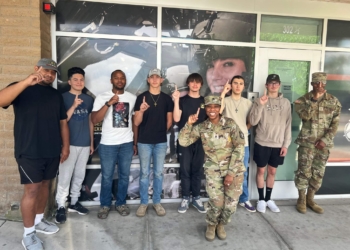As CEO and founder of 360 Privacy — a digital security company based in Franklin, Tennessee, Adam Jackson doesn’t leave anything to chance. His company scrubs hundreds of websites that sell personal data, making sure there’s not a trace of sensitive information left behind that could be used to exploit the athletes, entertainers, corporate executives and other high-net-worth individuals that make up his client base. He is diligent about protecting his clients from individuals looking to harm them or steal their identity or assets. Business is booming, with revenues tripling over just the last six months.
Jackson’s own story, however, is “convoluted and very winding.” The success his business has been seeing is a testament that a successful transition out of the military requires swift and savvy maneuvering.
Jackson, who grew up in a small Indiana town, entered the Army thinking he’d do a three-year enlistment. He ended up staying 10 years, moving from infantryman to the 5th Special Forces Group. As a Green Beret he deployed to Jordan and Syria and was responsible for communications. When he left the Army in 2017, he planned to launch a business using biometric scanning software he’d develop to keep pedophiles and “other bad actors” out of schools. Jackson had started bringing the product to market when a clash with the Tennessee state licensing bureaucracy forced him to shut down.
Next, he developed a version of the software for musicians on tour and went on the road with country singer Jason Aldean as head of tour security. Aldean had been onstage at a Las Vegas music festival on October 1, 2017, when a gunman began firing more than 1,000 rounds of ammunition, leaving 60 people dead and hundreds injured. A few months into the tour, Jackson developed new software to protect people from cyberstalkers.
“Word spread and soon we had dozens of clients for this new service,” Jackson said.
In March 2019, he launched 360 Privacy with a small team of other former Green Berets.
“We basically transplanted the special operations forces culture we came from into our business,” Jackson said.

“In the military, we were constantly asked to do incredibly difficult things without the proper equipment, manpower, or resources. At 360 Privacy, we are constantly asked to do things that are outside the scope of our core product and we always get it done. We have been successful because we have been able to accomplish those things using the same mission-focused mentality we used in the military.”
Jackson says that everyone leaves the military with a plan but those who are most successful at making a transition to a civilian career recognize the plan is just a starting point.
“The people who do the best at transitioning are able to be flexible, assess the opportunities that are in front of them and decide when a pivot from their original plan is appropriate,” he said. “What’s more, that pivot can facilitate the success of others. When I left Aldean’s tour, I put a service member I had served with in my place.”
Another key to success is to recognize the diversity of your skillset. “In the military, you always have a second and sometimes a third job,” Jackson said.
“You might be an equal opportunity rep for your company or a battalion armorer. Not only do you have these specific skillsets, you have the capacity to develop new skills. That’s an extremely powerful strength to leverage in the job market. For example, I’ve seen a lot of soldiers leave the military, get a nine-to-five job in a warehouse to pay the bills and then go to school at night to get a computer certification for the career that they want.”
3 easy ways to protect your digital privacy
Be selective about sharing your email. “If a service is free,” Jackson says, “then you’re the product and your data is being sold to anyone who wants to buy it.”
Do a cost-benefit analysis. The savings you’ll earn from a supermarket shopper loyalty card might be worth having your information sold to advertisers, but the same is likely not true for every store or newsletter.
Use a VPN, or Virtual Private Network. With a subscription to a VPN, which can cost as little as $10 a month, instead of directly connecting to a website from your computer, laptop or phone, you’ll connect through a secure network, leaving your browsing history and any information you share untraceable.
Skip the passwords that are automatically generated by your internet browser as well as your computer’s built-in password saver. Instead, generate passwords that have a minimum of 12 characters and include a mix of upper- and lower-case letters, symbols and numbers. Keep track of them with a password manager like LastPass.
Read comments












































